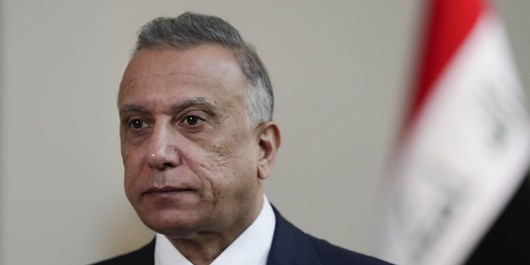Assassination attempt of Mustafa Al-Kazemi; Scenarios and consequences.
In response to the assassination attempt on the Iraqi Prime Minister, reactions have taken place at various levels, and examining the possible dimensions, contexts and scenarios for this failed assassination can reveal its hidden angles.
According to the published news, this action was carried out by three drones that could not be tracked by radar due to flying at low altitude. The move is said to have taken place as the Iraqi prime minister was returning from a visit to security forces who were standing in front of a number of protesters in Baghdad. Al-Kazemi was not injured in the incident; But in addition to some material damage, a number of his bodyguards were also injured.
In response to the assassination attempt on al-Kadhimi, reactions took place at various levels, which could be domestic (including Iran, Saudi Arabia, the United Arab Emirates), regionally (including Iran and Saudi Arabia), and internationally (including the United States). The United Nations and some other powers) categorized them.
In Iraq, given the complex situation and the worrying situation in the country, from the protest against the results of the Iraqi parliamentary elections held on October 10, 1400, to the many economic problems that continue to overshadow the livelihood of the people Al-Kadhimi’s assassination will have important consequences, part of which will affect the future of al-Hashd al-Shabi forces and resistance groups in Iraq, he said. This short memo examines the possible dimensions, contexts, and scenarios of the al-Kazemi assassination case in order to gain insight into its hidden angles.
1. Attempting to assassinate or making excuses for possible future changes.
After the assassination of Al-Kadhimi, his first reaction to the incident was via Twitter. “I was and am the project for the salvation of Iraq and the Iraqi people. The missiles of betrayal do not disappoint the believers,” he tweeted. In the steadfastness and insistence of our heroic security forces to maintain the security of the people, the realization of rights and the rule of law, not a single hair will be shaken. “Praise be to God, I am well among my people, and I call on everyone to be calm and restrained because of Iraq.”
Before addressing the possible contexts and scenarios of the assassination attempt against al-Kadhimi, internal and external reactions to the incident are examined.
2. Responses to Al-Kazemi’s assassination.
In the aftermath of the assassination attempt on al-Kadhimi, reactions against the move came at three levels: domestic, regional, and international. At the Iraqi level, leaders of the forces, prominent figures and party leaders (including Muqtada al-Sadr, leader of the Sairun faction, President Barham Saleh, Speaker of the Iraqi Parliament Mohammed al-Halbousi, Hadi al-Amiri, chairman of the Fatah coalition, Abu Ali al-Askari, head of Hezbollah books, Ammar al-Hakim, chairman of the coalition National government forces, Sheikh Qais Khazali, secretary general of Asaeb Ahl al-Haq, Nachirvan Barzani, head of the Kurdistan Region, Nouri al-Maliki, head of the Coalition for the Rule of Law, and Haidar al-Abadi, head of the Nasr Coalition, condemned the move and called for stability and security in Iraq. Like Sadr and Saleh, they described the act as terrorist.
At the regional level, some countries such as the Islamic Republic of Iran (Shamkhani Secretary of the Supreme National Security Council, Ministry of Foreign Affairs, Sardar Qaani’s visit to Iraq and meeting with Iraqi officials), Saudi Arabia (Ministry of Foreign Affairs and telephone conversation between Mohammad bin Salman and Al-Kazemi), Egypt ( President Abdel Fattah al-Sisi and Lebanon (Lebanese President Michel Aoun) reacted. The Islamic Republic of Iran called for “vigilance to thwart terrorist plots” and new sedition. At the international level, the UN Office in Iraq and US officials (the president) also reacted to the incident.
3. Grounds for the assassination of Al-Kadhim.
Logically, not every event in politics, including assassination, can be considered without regard to the background. Regarding the assassination of al-Kadhimi, however, there are several grounds for this; But the two most important reasons are as follows.
Parliamentary elections on October 10, 2021
In the October 10, 2021 Iraqi parliamentary elections, the Al-Fatah Coalition, the political wing of the resistance, won 16 seats, down from a third of the 48 it won in the 2018 elections. “We will not accept the imposition of will, and we may boycott the entire political process if the demands are not dealt with seriously and seriously,” al-Amiri said after the election results were announced. In his view, one of the main reasons for the current political crisis in Iraq is “confusion and confusion in the work of the commission” because the commission, chaired by the UN representative, undertook several measures before the election to reassure political forces not to falsify Do the results; But he did not adhere to it.
That is why some experts believe that this attack, for which no party has so far claimed responsibility, is an integral part of the election-related developments. Voter turnout was 43 percent, reflecting the people’s frustration with the Iraqi government and politicians. In this election, the Sadr / Sairun faction led by Muqtada al-Sadr won the most votes.
According to the announced results, the “Sadr Movement” came in first with 73 seats out of a total of 329 seats, followed by the “Progress” coalition led by Speaker Mohammad al-Halbousi with 37 seats. The State of Law Coalition led by Nouri al-Maliki came in third with 34 seats, and the Kurdistan Democratic Party led by Massoud Barzani came in fourth with 32 seats. The Fatah coalition, which represents the political wing of al-Hashd al-Shabi, came in fifth with 17 seats, and the Kurdistan Coalition, which includes the Patriotic Union of Kurdistan and other Kurdish forces, came in sixth with 16 seats.









